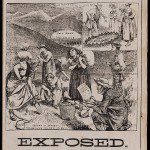
(Wikimedia Commons)
Some very raw notes from part of a manuscript:
“He called me by name, and said unto me that he was a messenger sent from the presence of God to me, and that his name was Moroni; that God had a work for me to do; and that my name should be had for good and evil among all nations, kindreds, and tongues, or that it should be both good and evil spoken of among all people.”
“The ends of the earth shall inquire after thy name,” Joseph was told in March 1839, while languishing in a jail on the Missouri frontier, “and fools shall have thee in derision.”[1]
What are the odds?
Illinois Governor Thomas Ford died in 1850, a month prior to his fiftieth birthday. He completed his term as governor in 1846, and moved to the farm of his wife’s parents, where he wrote his History of Illinois:
In this history, he gives a rather detailed account of the death of Joseph and Hyrum Smith. He concludes with this summary statement: “Thus fell Joe Smith, the most successful impostor in modern times; a man who, though ignorant and coarse, had some great natural parts which fitted him for temporary success, but which were so obscured and counteracted by the inherent corruption and vices of his nature that he never could succeed in establishing a system of policy which looked to permanent success in the future” (A History of Illinois, 2 vols., Chicago: Lakeside Press, 1946, 2:213).
Such the appraisal of Joseph Smith by Thomas Ford.
I do not wish to be critical of Governor Ford. I feel sorry for him. He was out of his depth. I regard him as one who sowed the wind and reaped the whirlwind.
In April of 1847, when the Latter-day Saints began their long westward march from Winter Quarters on the Missouri to the valley of the Great Salt Lake, Governor Ford and his family moved to Peoria with the intent of practicing law there. I quote from Milo Quaife:
“The story of his three-years’ sojourn there is one of unrelieved poverty and defeat. Mrs. Ford, afflicted with cancer, died October 12, 1850, at the early age of thirty-eight. Three weeks later, on November 3, he followed her to the grave. Left behind were five orphan children, penniless and of tender years, to face the world as best they might. To the credit of common humanity all were taken in charge by considerate townsmen and reared in homes which were better than their own father could provide. In his closing weeks he had been an object of charity, and his funeral expenses were met by the gifts of a group of citizens” (ibid., 1:xxvi, xxvii).
Both Thomas Ford and his wife were buried in the Peoria City Cemetery. Their remains were later moved to the Springdale Cemetery, where the grave remained unmarked until 1896, when the legislature provided an appropriation of $1,200 for the monument that now marks the site of his burial.
After the governor’s death and after his debts were paid, there remained a total of $148.06 for distribution among his five children as their inheritance.
In his introduction to Ford’s History, General James Shields relates: “In 1850 while the author of this work was on his death-bed, he placed in my hands a manuscript, with the contents of which I was then wholly unacquainted, with the injunction that after his decease I should have it published for the benefit of his family. He soon after departed this life, leaving his orphan children in a destitute condition.” The royalties from the sale of the book yielded $750, making it possible for each of his five children to receive $150 as their meager financial inheritance beyond the $29.61 left each by their father.
The eldest daughter married; her husband died in 1878; she lived until 1910, the last few years cared for by others. The second daughter married, reared a family, and died in St. Louis. The younger daughter, born in 1841, died at the age of 21 of “consumption,” and was buried with her parents. Concerning the two sons, I quote again from Mr. Quaife:
“In the autumn of 1872 Thomas [the youngest son] was hung as a horse thief near Caldwell, Kansas, by a lynching party. Two years later, in 1874, Seuel [his brother] and two other outlaws were hung from the same branch of a tree near Wellington, Kansas, by another lynching party” (ibid., 1:xxxii). They were buried in unmarked graves on the Kansas prairie.[2]
[1] Doctrine and Covenants 122:1.
[2] From Gordon B. Hinckley, “The Greatest Miracle in Human History,” Ensign, May 1994, 72.














